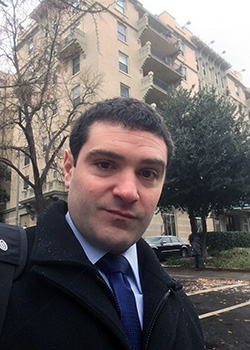Meet Politics Prof Jack Santucci
January 3, 2019
 Jack Santucci, PhD
Jack Santucci, PhD
Assistant Teaching Professor of Politics Jon “Jack” Santucci, PhD, has studied proportional represenation and attitudes toward the electoral process, and encourages his students to dig deeper into political narratives.
Hometown: New Haven County, Connecticut
Degree: PhD in Government, Georgetown University
Research interests: Why Americans change their voting systems (to proportional or ranked-choice voting, for example) and how this relates to the structure of our party system
What did you do before coming to Drexel?
Last year, I was a research fellow at the Democracy Fund, a private foundation that supports government reform. My main job was to analyze survey data on Americans’ attitudes toward the electoral process. After the fellowship ended in May, I freelanced on research projects to measure racially polarized voting and see how voting systems might affect diversity in big-city government.
How did you become interested in your area of research?
My first job out of college made the case for proportional representation (PR). The point of a PR voting system is for groups or parties to win representation based on their shares of total votes. It turns out that PR systems were widespread in the United States during the Progressive and New Deal Eras. Based on what we know about PR in foreign countries, most would say this is a good thing. The strange thing about the U.S., though, is that all but one of these PR systems ended up repealed. So, I have spent the past five years peeling back that history. I am writing a book about it, good and bad alike.
What book, movie or song has recently inspired you?
Beethoven symphonies get me through tough times. Also, if you haven’t listened to the Red Hot Chili Peppers’ “One Hot Minute” from start to finish, I highly recommend it.
When is the last time you did something “for the first time”? What was it?
I went fly fishing with my dad in Montana last summer. I usually fish with a spinning rod — what he calls a “machine gun.”
If you had a year free from all responsibility, what would you do?
I would collect every last shred of data I could find on proportional voting’s working in this country. Then I would retreat to the woods, analyze them in the R statistical package, and write, write, write.
What did you want to be when you were a kid? How did you ultimately decide to become a professor/researcher?
I wanted to be a journalist. Then, once I started writing A-grade papers in college, a teaching assistant told me I should consider academia. I went to the professor. She told me to “work a year in politics, then go to the best graduate program you can get into.” It took almost 14 years to get from there to Drexel.
What would students be surprised to learn about you?
I was not an “A” student until my senior year of college.
What was an impactful moment of your own college career?
Professor J. at McGill University assigned the best essay prompt I’d gotten to that point. Most professors simply wanted a research paper on whatever, as long as it was more-or-less related to the course material. Her assignment had a clear dependent variable. It didn’t ask us to sift through JSTOR (what we used instead of Google Scholar) for “money quotes” to paraphrase. Over the course of the semester, we’d read several arguments about why post-communist countries became democratic or not. Our job was to assess the logic of those arguments. This assignment taught me who I am intellectually and how to write a compelling paper. It is the reason I am where I am and a model for my own teaching.
What do you wish you had known when you were in college?
I wish I had gotten a fuller head start on statistics and what’s now called data science. Every job I’ve ever had was due to technical know-how.
Which current event/issue do you think students should know more about, and why?
It’s easy to get swept up in the national political narrative. I would pay more attention to (and maybe get involved in) state and local politics. This is where most policy will be made in the years to come. It’s also the start of what we call the “candidate pipeline.” So, getting involved at the local level is how to start to remake the parties and build a better future.
What does success mean to you?
My career will have been a success if I can pull off just two things. First, I want to inspire at least one student to go off and be great — like Professor J. at McGill did for me, or Denis Hunt, my history teacher in high school. Second, I want to spend lots of time with my mom, dad, uncle, brother, sister-in-law and awesome niece Dot. I want to bring my family back together as often as I can.
What do you hope to add to the CoAS community?
I hope to produce broadly trained and confident students. I want them to appreciate learning about a lot of things from different perspectives. And I want them to know where to start if they want to learn more about some topic or research method.